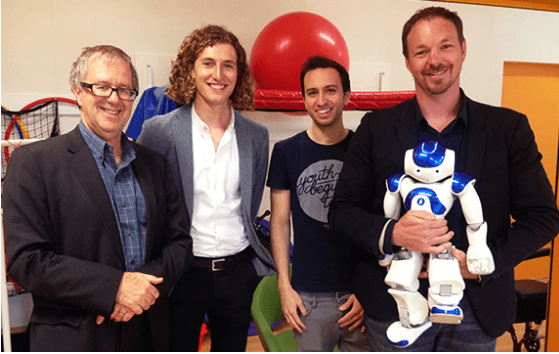Sep 22 2016
A Swinburne project that involved developing software for robots to act as therapy aids for children in rehabilitation has been shortlisted for a National Disability Awards.
 Left to right - Professor Emeritus Leon Sterling, Jonathan Kingsley (The Brainary), PhD student Felip Marti, and Dr Chris McCarthy with NAO, the humanoid robot. Credit: Swinburne
Left to right - Professor Emeritus Leon Sterling, Jonathan Kingsley (The Brainary), PhD student Felip Marti, and Dr Chris McCarthy with NAO, the humanoid robot. Credit: Swinburne
Working in partnership with the Royal Children’s Hospital (RCH), The Brainary and Transport Accident Commission (TAC), Swinburne is one a finalist in the category of Excellence in Technology.
Lead researcher, Dr Chris McCarthy, from the Department of Computer Science and Software Engineering at Swinburne, has been working collaboratively with Swinburne students and physiotherapists from RCH to program the robots.
“A unique aspect of our approach has been the central role of qualified physiotherapists in the programming of prescribed rehabilitation exercises,” Dr McCarthy says.
NAO helps Deegan form a bridge
“We’ve programmed the NAO robots with over 25 physio-configured exercise demonstrations and interactive behaviours.”
Using NAO robots to motivate children
The ability to maintain a child’s motivation and focus on performing prescribed exercises presents a huge challenge for paediatric rehabilitation.
“Physiotherapists and parents have noted significant improvements in both the motivation and compliance of the child when engaging with the robot during therapy, compared to when not,” Dr McCarthy says.
“We’ve found the impact to be greatest among the more challenging patients, where sessions without NAO robots are often aborted due to patient distress, fatigue or complete loss of will to continue. In some cases, therapists have noted a complete reversal of this.
“While the program is still in the early days, we can confidently say that technology can offer a genuine benefit for therapy delivery and improvements in rehabilitation outcomes for young children.”
Not wanting to restrict the robot use to rehabilitation, the team is already exploring the use of social robots like NAO for other paediatric health care needs. It is also hoped that one day families with children undergoing rehabilitation will be able to make use of the technology in their own homes.
The National Disability Awards honour and recognise the outstanding achievements of individuals and organisations that have improved the lives of people with disability.
The awards ceremony will be held at Parliament House in Canberra on 7 November.
This project was initiated by Professor Leon Sterling from Swinburne and made possible through a successful funding grant from TAC, and student funding support from CSIRO Data61.